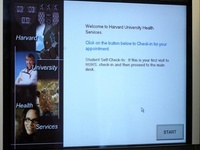The practice is used by many managed care organizations and minimizes payrolls, but some students say they have felt neglected and alone as they try to coordinate their own care between clinicians.
Additionally, Harvard has implemented a new policy allowing for only two to four months of therapy, which students say amounts to no more than a conveyor belt of treatment aimed at making the best use of a limited number of therapists.
But administrators say it’s financially impossible for the University to keep tabs on every student who walks through UHS’s doors.
“I feel this tension,” says University Provost Steven E. Hyman, who is former director of the National Institute of Mental Health. “What do I want? I want every person here who is in distress to identify themselves and get the best possible individualized care to help them. I also want to be able to afford this.”
Cracks in Split Care
In a letter to administrators last year, Elizabeth J. Quinn ’04 described a friend who, after being placed in a psychiatric hospital following a manic episode, got medication from a UHS psychiatrist weekly for three months without getting any therapy.
“That UHS psychiatrists could, one week, determine that this student was dangerously incapable of caring for herself and, the next week, think she was capable of independently organizing her own elaborate treatment program while adjusting dosages of sometimes-debilitating psycho-pharmaceuticals and taking four classes is simply absurd,” Quinn wrote.
The experiences of students like Quinn’s friend and Whitman reveal the cracks that pervade UHS’s “split care” treatment system.
In “split care,” some psychiatrists and nurse practitioners provide medication, while other nurse practitioners, psychologists and social workers provide therapy. Traditionally, psychiatrists provided talk therapy and medication to patients who required both.
Some students with serious mental health problems say navigating a system of clinicians with subtly varying purposes is too daunting.
While seeing only one clinician for care may be easier for students with severe mental health problems to manage, it is also expensive.
Psychiatrists earn a mean annual salary of $135,220, and psychologists earn $56,540, according to Department of Labor statistics.
UHS Mental Health Services Director Dr. Richard D. Kadison simply says that split care is the system that best allows UHS to meet the needs of students. But other mental health experts say its roots are economic.
“Split care is driven by financing. Health insurers—and the Harvard system is in effect an insurance company—restrict psychiatrists to prescribing and only the very highest care, and therapists, who are cheaper, are dedicated to therapy,” says Meredith Rosenthal, assistant professor of health economics and policy at the School of Public Health. “It’s a very typical pattern.”
Richard Hermann, an assistant professor of psychiatry at Harvard Medical School, says that there’s nothing wrong with the split care model, as long as communication is kept open between the two clinicians.
Read more in News
Chapel May Remain in Cambridge Permanently














